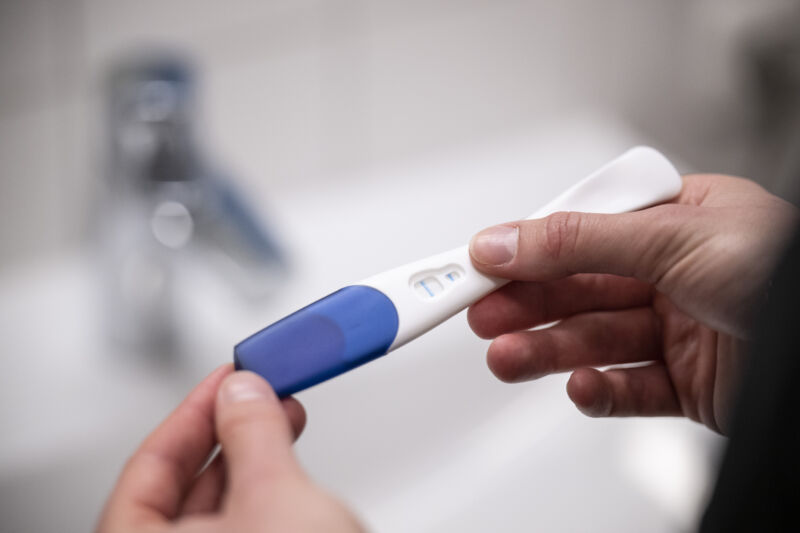
A year after the fall of Roe v. Wade, clinical researchers are still grappling with how to ethically adjust to the new reality—which at this point involves abortion bans and restrictions in roughly half of US states.
In a policy forum piece published Thursday in Science, a group of health experts and bioethicists led by Jeremy Sugarman at Johns Hopkins University lays out the ethical, legal, and practical challenges researchers face in the new era.
Bans and restrictions lead to “increased maternal morbidity and mortality and deepening socioeconomic and racial inequities,” they wrote, but also “pose risks to clinical research participants and potentially compromise the scientific and social value of some research.”
Clinical trials of experimental treatments inherently pose unknown risks to participants’ health—and even their lives. For pregnant participants, those risks can extend to their fetuses. As such, it’s standard for trials to include periodic pregnancy testing for all participants capable of getting pregnant and for participants to agree to use contraception. But, with nearly half of all pregnancies in the world being unintended, it’s no surprise that unexpected pregnancies can and do arise in the course of clinical research.
When that happens, a pregnant participant may feel termination is the best option for them, given the risks of the trial. But abortion restrictions and bans could make that option difficult to obtain, if not entirely out of reach, depending on the trial’s location. Moreover, trial protocols that require in-clinic pregnancy testing could create paper trails, which may pose legal risks for both participants and clinical research staff. This could be the case even if a participant doesn’t pursue termination. There are high rates of miscarriages early in pregnancies, and clinical trial protocols that involve periodic testing can pick up pregnancies that would have otherwise come and gone without notice. Miscarriages (aka spontaneous abortions) are indistinguishable from medically induced abortions.
Real risks
This isn’t a hypothetical scenario. In an op-ed last year in Stat, Aoife Brennan, the CEO of a Massachusetts-based company developing treatments for metabolic and immune-based diseases, described the situation of a 32-year-old woman who was participating in a Phase 1 trial. She tested negative for pregnancy at enrollment and agreed to use contraception. Still, when she checked in for the second phase of the trial, she tested positive. A visit to her OB-GYN revealed that she had a spontaneous abortion, in line with her history of recurrent miscarriages and irregular menstrual cycles. At the time, the only consequence was that she was disqualified from the rest of the trial. But, “Post-Dobbs, and in a different state, she might now be suspected of a criminal act,” Brennan wrote.
One suspicion raised by such a case is a self-managed abortion, which is a medication-based abortion done without medical supervision (usually at home) using pills that people are able to order online from a variety of places. So far, none of the new restrictions and bans since Roe v. Wade fell have directly criminalized self-managed abortion, though three states had such laws on the books prior to that (Oklahoma, Nevada, and South Carolina). Still, according to an analysis last year by If/When/How, a legal organization that supports abortion rights, states don’t have to have those laws to try to prosecute people. The organization identified 61 cases in 26 states of people being criminally investigated or arrested for allegedly self-managing their own abortions or helping someone else do so.
“So what this means is that overzealous prosecutors and police misapplied criminal laws to arrest people,” Laura Huss, lead author of the report, told NPR last August. And there are certainly anti-abortion groups who hope to see more criminal punishments for people who terminate pregnancies.
But, rather than going after pregnant people directly, the new restrictions and bans over the past year focus on people and health care providers who provide or aid abortion. The rules threaten penalties, fines, and even jail time. In Alabama, providing abortions of viable fetuses can be punishable by life in prison (Title 26). A Texas law encourages private citizens to sue anyone suspected of providing or aiding someone in obtaining an abortion, with statutory judgments no less than $10,000, plus legal fees. A poorly written law in North Carolina, set to come into effect July 1, suggests it may be unlawful for providers to even “advise” patients on seeking abortion after the state’s 12-week ban, even for lawful procedures in other states. (The law is facing a federal lawsuit, which, among other things, argues that this provision violates the First Amendment rights of providers.)
https://arstechnica.com/?p=1949648

